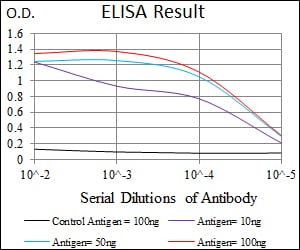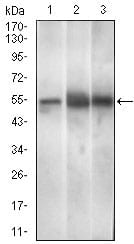

| WB | 1/500 - 1/2000 | Human,Mouse,Rat |
| IF | 咨询技术 | Human,Mouse,Rat |
| IHC | 咨询技术 | Human,Mouse,Rat |
| ICC | 技术咨询 | Human,Mouse,Rat |
| FCM | 咨询技术 | Human,Mouse,Rat |
| Elisa | 1/10000 | Human,Mouse,Rat |
| Aliases | WS1; WS3; CDHS; HUP2 |
| Entrez GeneID | 5077 |
| clone | 7D8G7 |
| WB Predicted band size | 53kDa |
| Host/Isotype | Mouse IgG1 |
| Antibody Type | Primary antibody |
| Storage | Store at 4°C short term. Aliquot and store at -20°C long term. Avoid freeze/thaw cycles. |
| Species Reactivity | Human,Mouse |
| Immunogen | Purified recombinant fragment of human PAX3 (AA: 142-203) expressed in E. Coli. |
| Formulation | Purified antibody in PBS with 0.05% sodium azide |
+ +
以下是关于PAX3抗体的3篇代表性文献,按研究领域分类简要概括:
1. **文献名称**:*PAX3 in embryonic neural crest development and cancer*
**作者**:Keller, R., & Nieto, M. A.
**摘要**:研究PAX3在胚胎神经嵴细胞分化和迁移中的作用,通过抗体染色发现PAX3表达与黑色素细胞前体发育相关,并探讨其在黑色素瘤中异常表达的潜在机制。
2. **文献名称**:*PAX3-FOXO1 fusion gene drives rhabdomyosarcoma via chromatin remodeling*
**作者**:Goding, C. R., et al.
**摘要**:利用PAX3抗体进行染色质免疫沉淀(ChIP),揭示PAX3-FOXO1融合蛋白通过调控靶基因(如MYOD)的表观遗传修饰促进横纹肌肉瘤发生,提示其作为治疗靶点的可能性。
3. **文献名称**:*PAX3-mediated transcriptional regulation in muscle stem cell activation*
**作者**:Lengner, C. J., et al.
**摘要**:通过PAX3抗体标记的免疫荧光和流式分选,发现PAX3在成年肌肉干细胞中的动态表达模式,证实其在损伤后肌卫星细胞增殖和分化中的关键调控作用。
**备注**:PAX3抗体常见于发育生物学(神经嵴、肌肉分化)及肿瘤研究(如黑色素瘤、横纹肌肉瘤),上述文献覆盖其基础机制与转化应用。如需实验方法细节,可进一步检索抗体货号及验证数据(如WB/IHC结果)。
The PAX3 antibody is a crucial tool in developmental biology and cancer research, targeting the PAX3 protein encoded by the *PAX3* gene. PAX3 belongs to the paired box (PAX) family of transcription factors, characterized by a conserved DNA-binding paired domain and a homeodomain. It plays a pivotal role in embryonic development, particularly in neural crest cell migration, muscle formation, and nervous system differentiation. Dysregulation of PAX3 is linked to congenital disorders like Waardenburg syndrome (types 1 and 3) and pathological conditions such as alveolar rhabdomyosarcoma (ARMS), where chromosomal translocations generate oncogenic PAX3-FOXO1 fusion proteins.
PAX3 antibodies are widely used in immunohistochemistry (IHC), Western blotting, and immunofluorescence to detect PAX3 expression levels, cellular localization, and fusion protein activity. Researchers employ these antibodies to study PAX3's role in tissue-specific gene regulation, cancer progression, and stem cell biology. Specificity varies among clones; some recognize the N-terminal region (common in fusion protein detection), while others target the C-terminal or full-length protein. Commercial PAX3 antibodies are typically validated in multiple applications, but optimization is recommended for specific experimental conditions. Recent studies also explore PAX3 as a potential therapeutic target, amplifying the antibody's diagnostic and translational relevance.
×